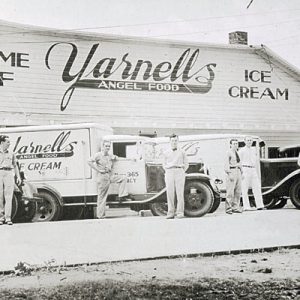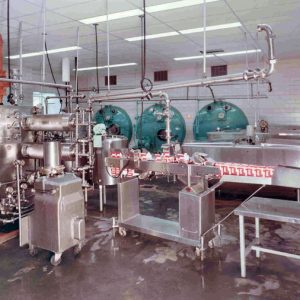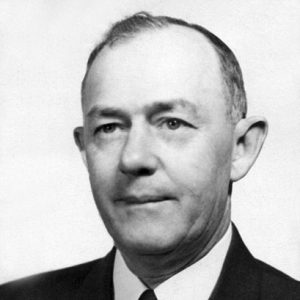calsfoundation@cals.org
Yarnell's Ice Cream Company
Yarnell’s Ice Cream Company, headquartered in Searcy (White County), maintained operations through four generations of the Yarnell family from 1932 to 2011. The only ice cream-producing company in Arkansas, it had branches in Fort Smith (Sebastian County), Hot Springs (Garland County), Paragould (Greene County), Texarkana (Miller County), and West Memphis (Crittenden County). The company closed amid bankruptcy in 2011, but was purchased in 2012 by Schulze and Burch Biscuit Co. and relaunched in April 2012.
The predecessor of Yarnell’s, the Grisham Ice Cream Company, produced Grisham’s Angel Food Ice Cream. Grisham was headquartered at Searcy in 1923, though it had plants in McGehee (Desha County) and Morrilton (Conway County). The company merged in 1927 with the Terry Dairy Co., which had locations in El Dorado (Union County), Hot Springs, Little Rock (Pulaski County), and Newport (Jackson County). Ben Grisham was general manager of the new company, with William Terry serving as president. Both Raymond Muncy and T. R. Garner, in their histories of Searcy, note that “they had a fireball salesman and assistant manager working for them by the name of Ray Yarnell.”
Grisham’s ice cream used the slogan, “Angel Food Ice Cream is All Cream.” The company built a refrigerated room to harden and freeze the Angel Food ice cream that differed in texture from the slushier product resembling homemade ice cream that was generally the norm for the ice cream of the day. With the addition of an ammonia ice cream freezer, ten gallons of ice cream could be frozen at the Grisham plant without using ice and salt, the usual method at the time.
In the 1920s, Grisham was one of several community ice cream companies in Arkansas, which were necessary in small towns because of the lack of electricity in rural areas. Grisham’s ice cream could not be kept cold and shipped for long periods until 1929, when the company bought a refrigerated truck and began its first truck route, keeping the ice cream cold by using salt and ice. The truck could hold 125 gallons and ran alternately between Searcy and Cabot (Lonoke County) in the south and to Tuckerman (Jackson County) in the north.
In 1929, with the coming of hard times, Grisham sold to Southwest Dairy Products with its Dairyland brand. That company went bankrupt, and in 1932, Ray Yarnell bought the plant from Southwest Dairy Products. Muncy notes that Ray Yarnell had to pull together all available cash on hand and borrow on his life insurance policy to make the purchase. Right after doing so, the “bank holiday” of March 1933 was declared by the federal government, and his funds were frozen. Ray Yarnell drew no salary for a year and had to borrow additional funds to run the business; as Muncy writes, “There were times during the winter when not a single item they manufactured was sold.”
After surviving those early Depression-era days, Yarnell’s Ice Cream Company steadily processed ice cream products sold locally throughout the 1930s and 1940s. Ray Yarnell’s wife, Hallie Rogers Yarnell, was bookkeeper, and their son Albert augmented the company’s truck routes by delivering the ice cream on his bicycle. By the end of the 1930s, they were able to buy their first electrically refrigerated truck.
In 1948, Albert Yarnell returned from serving in the Signal Corps during World War II and was named vice president and sales manager, helping guide the company through its first major plant expansion in 1951. The expansion increased the company’s ice cream production ability to the point that its sales territory expanded through central and south Arkansas. Albert Yarnell was named general manager in 1960, and upon the death of his father in 1974, he became president.
In 1970, the company reached $1 million in sales. Five years later, Albert’s son Rogers joined the company. Yarnell’s introduced the nation’s first all-natural ice milk for the health-conscious in 1978, and by 1984, the company was marketing its product throughout the region, receiving acclaim for its “Down Home Goodness.” In 1991, Yarnell’s introduced Guilt Free, a product that their website says is America’s first fat-free, no-sugar-added line of ice cream (sweetened with NutraSweet).
Until its closure in 2011, “Mr. Albert” Yarnell served as chairman, Rogers Yarnell as president/chief executive officer, and fourth-generation Christina Yarnell, who joined the business in 2001, served as Custom Brand Manager. The company frequently introduced new products along with its traditional favorites and ice cream novelties. Yarnell’s had sales in Arkansas, Louisiana, Mississippi, Missouri, Oklahoma, and Tennessee and was the only remaining ice cream company in Arkansas until June 30, 2011, when the company abruptly ceased operations, citing a poor economy combined with its inability to obtain financing or find a buyer.
In November 2011, Schulze and Burch Biscuit Company of Chicago, Illinois, acquired the Yarnell’s plant and most of the recipes at auction for a reported sum of $1.3 million. The company relaunched the Yarnell’s brand in April 2012, with a new mascot, “Scoop,” and a fifty-six-ounce “sqround” box—square with rounded edges. Governor Mike Beebe made the first ceremonial scoop at a press conference at the state capitol on April 19, 2012. In June 2020, Schulze and Burch sold the production facility in Searcy to Turkey Hill Dairy of Pennsylvania but retained ownership of the Yarnell’s brand.
For additional information:
Best, Eddie. “Ice Cream Memories.” White County Historical Society. http://www.argenweb.net/white/wchs/Yarnell_IceCream_files/Ice_Cream_Memories.html (accessed July 15, 2022).
Cottingham, Jan. “Yarnell’s: 75 Years and Going Strong.” Arkansas Business, June 30, 2007.
Muncy, Raymond Lee. Searcy, Arkansas: A Frontier Town Grows Up With America. Searcy, AR: Harding Press, 1976.
Wire, Sarah D. “Yarnell’s 2nd Coming Praised.” Arkansas Democrat-Gazette, April 20, 2012, p. 3B.
Yarnell’s Ice Cream Company. http://www.yarnells.com (accessed July 15, 2022).
“Yarnell’s Provides ‘Real World’ Experiences for Teachers.” The Daily Citizen, July 1, 2007, p. 1C.
Nancy Hendricks
Arkansas State University
 Business, Commerce, and Industry
Business, Commerce, and Industry Food and Foodways
Food and Foodways Yarnell Ice Cream Company
Yarnell Ice Cream Company  Yarnell Ice Cream Company
Yarnell Ice Cream Company  Yarnell Packaging
Yarnell Packaging  Ray Yarnell
Ray Yarnell 



Comments
No comments on this entry yet.